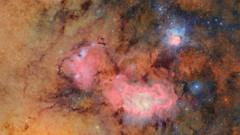A recent incident in Georgia has revealed a meteorite older than Earth, following a dramatic entry into the atmosphere. On June 26, the object, dubbed the McDonough meteorite, exploded over Georgia, leaving fragments that researchers at the University of Georgia analyzed. Findings suggest that this meteorite formed around 4.56 billion years ago, 20 million years earlier than Earth.
Ancient Meteorite Found to Precede Earth’s Formation

Ancient Meteorite Found to Precede Earth’s Formation
Scientists discover a meteorite that crashed into a Georgian home is 4.56 billion years old, older than Earth itself.
Residents across Georgia reported a stunning fireball and loud boom as the meteor raced across the sky at approximately 1 kilometer per second before striking a home in McDonough. Scott Harris, a geologist involved in the study, noted the significance of the meteorite's age and its classification as a chondrite, a type known for its prevalence in the solar system.
The residence has become a point of interest, as fragments of the meteorite continue to be discovered on the property. With the McDonough meteorite now the 27th such find in Georgia, Harris emphasized the increased frequency of meteorite recoveries due to advanced technology and engaged citizens.
Research on the meteor's composition and characteristics is ongoing, with implications for planetary science and future asteroid threat assessments. Harris cautioned about the real possibility of larger objects impacting Earth and stressed the importance of preparedness.
Despite recent discoveries, he remained hopeful that further studies will enhance our understanding of these celestial bodies and contribute to potential protective strategies against future asteroid collisions.
The residence has become a point of interest, as fragments of the meteorite continue to be discovered on the property. With the McDonough meteorite now the 27th such find in Georgia, Harris emphasized the increased frequency of meteorite recoveries due to advanced technology and engaged citizens.
Research on the meteor's composition and characteristics is ongoing, with implications for planetary science and future asteroid threat assessments. Harris cautioned about the real possibility of larger objects impacting Earth and stressed the importance of preparedness.
Despite recent discoveries, he remained hopeful that further studies will enhance our understanding of these celestial bodies and contribute to potential protective strategies against future asteroid collisions.


















